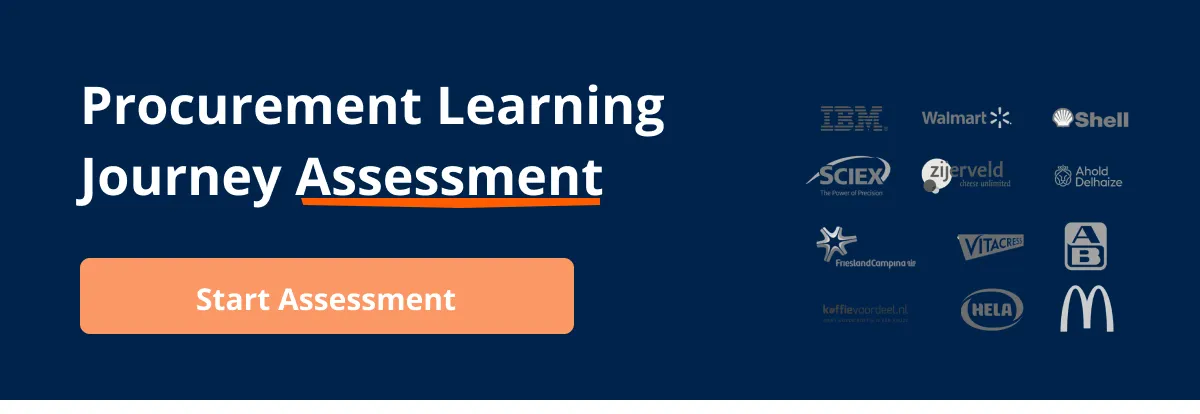ChatGPT & AI in
Procurement Course
Free Preview Lesson

Written by Marijn Overvest | Reviewed by Sjoerd Goedhart | Fact Checked by Ruud Emonds | Our editorial policy
Ethical Sourcing – Everything You Should Know In 2024
Key take-aways
- Ethical sourcing is essential for procurement managers as it aligns environmental responsibility with business growth.
- Reducing emissions, improving sustainability, and appealing to conscious consumers make ethical sourcing a competitive advantage.
- Setting moral guidelines, embedding them in contracts, and utilizing tools like Sedex and Delta eSourcing for effective management are all part of implementation.
As a procurement manager, ethical sourcing is a must. Because we are not just working towards growing our business, but it is also our responsibility. We can all do business without endangering the one planet where we live.
In this article, you will learn all about ethical sourcing and its importance. You will define what it is, why it is important, and why sourcing responsibly should be adopted in the procurement process by every company.
Ethical Sourcing Definition
Ethical sourcing is the practice of ensuring that products are procured in a responsible and sustainable manner, emphasizing fair treatment of workers, safe working conditions, minimized environmental and social impacts, and adherence to specified standards throughout the supply chain.
It is the sustainable and responsible approach to managing your supply chain and sole sourcing. While most companies nowadays are practicing it, the public also has a lot of organizations who are always keeping a watch on procurement processes to make sure that the sourcing of products, goods, and services are done responsibly and ethically.
In simple terms, ethical sourcing is about making sure everything is done in a good way when buying products. It’s important for companies to think about people, nature, and communities when they do business.
Whyis Ethical Sourcing Important?
Far from being just a strategy to mitigate business risks, protect brand integrity, or sidestep superficial environmental claims, ethical sourcing offers businesses a distinct edge over their market peers. Ultimately, by embracing ethical sourcing, companies can cut down on emissions, bolster sustainability, and even witness a surge in their profits.
In the current era, marked by the challenges of climate change, the significance of ethical sourcing has been amplified. Businesses are recognizing that success isn’t solely defined by volume and cost-effectiveness. Both consumers and investors are increasingly aligning with enterprises that proactively address environmental concerns.
Difference Between Ethical and Sustainable sourcing
Ethical sourcing emphasizes the fair treatment of people in the production process, ensuring fair wages, safe conditions, and upholding human rights. It addresses broader social issues, like community well-being.
Sustainable sourcing, on the other hand, focuses on environmental impact, ensuring resources are used without jeopardizing future needs. It considers the entire product lifecycle and long-term resource viability. While ethical sourcing centers on human welfare and sustainable sourcing on environmental concerns, there’s overlap: environmental harm affects communities, and long-term environmental health requires fair treatment of workers. Many companies integrate both principles for holistic responsible sourcing.
Examplesof Ethical Sourcing
Some of the best examples of ethical sourcing are often found in companies and organizations that deal with the procurement and sourcing of food and commodities:
- Fair Trade Products: Companies sourcing products like coffee, chocolate, or bananas might opt for Fair Trade-certified suppliers. This ensures that farmers receive a fair wage and work under decent conditions.
- Conflict-Free Minerals: Companies might source minerals like tantalum, tin, tungsten, and gold from mines that don’t finance armed conflict, particularly in regions like the Democratic Republic of Congo.
- Sustainable Timber: Furniture and paper companies might source wood from sustainably managed forests, ensuring that deforestation is minimized.
- Cruelty-Free Cosmetics: Cosmetic brands might commit to not testing their products on animals, ensuring no harm is done in the name of beauty in many places, however, there is no standard definition or legislation for this label rendering it seemingly meaningless.
- Organic Cotton: Clothing brands might source organic cotton, which is grown without harmful pesticides and chemicals, ensuring environmental health. Organic does not refer to working conditions, this needs to be checked separately.
- Living Wage Commitments: Companies might ensure that their suppliers pay workers a living wage, which is enough to meet basic needs and provide some discretionary income.
- Safe Working Conditions: Brands might audit factories in their supply chain to ensure they meet safety standards, especially in industries known for hazardous conditions, like clothing manufacturing in some Asian countries.
- No Child or Forced Labor: Companies might actively monitor and audit their supply chains to ensure that no child or forced labor is used at any stage of production.
- Local Sourcing: To support local economies and reduce carbon footprints, some companies prioritize sourcing goods and services from local suppliers. This makes it easier to make sure the product is ethically sourced.
- Seafood Sustainability: Restaurants and grocery stores might source seafood from fisheries that practice sustainable fishing methods, ensuring marine ecosystems are not over exploited. However, there is some controversy about the labels the industry uses.
How to ImplementEthical Sourcing
Ethical sourcing is implemented in the procurement process by adopting policies that monitor the ethical procurement and sourcing of products. Define standards related to labor practices, environmental sustainability, human rights, and other relevant ethical considerations.
The foundation of ethical sourcing lies with the buyers of a procurement team or those responsible for selecting suppliers and materials. They must consider the commitment level of potential suppliers through thorough assessment. Use questionnaires, interviews, and site visits to gather information.
Embed ethical standards and requirements into supplier contracts. Ensure there are clauses that allow for monitoring, reporting, and addressing non-compliance.
Be transparent by communicating your ethical sourcing practices to stakeholders, including customers, investors, and the general public. Publish regular reports detailing your efforts, achievements, and challenges in ethical sourcing.
Regularly review the effectiveness of your ethical sourcing strategy. Adapt and refine your approach based on feedback, audit results, and evolving global standards.
Companies That Can Help YouSource Ethically
In today’s procurement industry, there are companies that can help you source ethically. Take a look at these companies and see whether they’re the one you need:
Sedex’s tools and services allow organizations to manage and understand the risks of negative impacts in their supply chain. The risk assessment tool of Sedex assists organizations to assess ethical risks across the supply chain.1. Sedex
Estee Lauder is committed to sourcing high-quality ingredients and materials from around the world. It works tirelessly to source responsibly with attention to possible impacts on people and the environment.
It collaborates with a wide network of suppliers and aims to continuously enhance and strengthen its sourcing practice while remaining sensitive to the communities where it operates.
Delta eSourcing is an efficient supplier management tool can help businesses to achieve ethical procurement goals. This is where Delta eSourcing can help you. It helps organizations maximize the value of interactions with suppliers.
Procurement Expert’s Advice on Ethical Sourcing
For this article, we asked a seasoned procurement professional to share his insights regarding ethical sourcing practices.
Sjoerd Goedhart
Owner, Goedhart Interim Management & Consultancy
LinkedIn Profile: https://www.linkedin.com/in/sjoerdgoedhart/
1. What should readers know about ethical sourcing?
“Ethical and sustainable purchasing is increasingly included as mandatory in tenders, laws, and regulations from national/international governments. Companies must prepare for this and adapt this to their procurement strategy.”
2. What is the biggest misconception about ethical sourcing? What do most people get wrong about this topic?
“Ethical and sustainable sourcing are the norm. If companies do not have these aspects in their purchasing strategy, they become less and less interesting and relevant for customers and consumers.”
3. What challenges do companies face when trying to ensure their supply chain is ethically sourced?
“The biggest challenge is to manage the compliance and certification registrations which are mandatory.”
4. How can consumers verify that products are truly ethically sourced?
“By proof of certification provided by the supplier or manufacturer of the product. Within the consumer goods, this proof is placed in the packaging.”
5. What can procurement professionals do to prevent unethical sourcing, such as the use of sweatshops?
“Legislation, certification, and announced and unannounced inspections of production locations.”
6. Do you think that procurement professionals have a big role in stopping unethical sourcing completely?
“Absolutely, procurement professionals play a pivotal role in effectively halting unethical sourcing practices. Their significant role involves integrating stringent requirements for suppliers and their products, ensuring no compromises are made in the final selection process for doing business. Such measures greatly contribute to putting a stop to unethical practices within the sourcing realm.”
In Conclusion
To conclude, ethical sourcing stands as an important process in modern procurement practices. It is a commitment to responsible and sustainable procurement, ensuring fair treatment of workers, safe working conditions, reduced environmental and social impacts, and compliance with predefined standards across the supply chain.
Ethical sourcing not only protects brand integrity and mitigates risks but also presents businesses with a distinct competitive edge in an era where consumers and investors increasingly prioritize ethical considerations.
Implementing ethical sourcing requires a proactive commitment from procurement teams. Companies must establish robust assessment processes, integrate ethical standards in supplier contracts, and transparently communicate their practices to stakeholders.
Regular reviews and adaptations ensure that ethical sourcing strategies remain effective and aligned with evolving global standards.
Furthermore, ethical sourcing goes beyond transactional exchanges, embodying a conscious effort to harmonize business objectives with societal well-being and environmental protection.
Frequentlyasked questions
What is ethical sourcing?
Ethical sourcing is the search for suppliers who are manufacturing their supplies in a responsible and ethical manner.
How to do ethical sourcing?
Careful planning and data gathering must be used to find the right sources of supplies. Avoid suppliers who have a reputation for procuring their supplies through dubious or unethical means.
How is ethical sourcing different from normal sourcing?
With ethical sourcing, there is great emphasis on the distribution of supplies using ethical and responsible means. With normal sourcing, only the procurement of supplies at a good price is an important fact.
About the author
My name is Marijn Overvest, I’m the founder of Procurement Tactics. I have a deep passion for procurement, and I’ve upskilled over 200 procurement teams from all over the world. When I’m not working, I love running and cycling.


